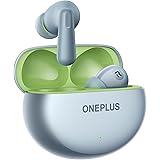OnePlus Nord Buds 3 Truly Wireless Bluetooth in Ear Earbuds with up to 32dB Active Noise Cancellation, 10mins for 11Hours Fast Charging with Up to 43h Music Playback -Chromatic Blue
₹2,299.00 (as of March 13, 2025 21:08 GMT +05:30 - More infoProduct prices and availability are accurate as of the date/time indicated and are subject to change. Any price and availability information displayed on [relevant Amazon Site(s), as applicable] at the time of purchase will apply to the purchase of this product.)In today’s fast-paced healthcare environment, efficient documentation and record-keeping are crucial for mental health professionals. Electronic Health Records (EHR) systems have revolutionized the way practitioners manage patient information, providing a streamlined approach that enhances patient care and improves overall practice management. This article explores how choosing the best EHR for mental health can significantly impact your practice and the benefits of understanding electronic medical record documentation.
Why the Best EHR for Mental Health Matters
Selecting the right EHR system is particularly important for mental health practices. Unlike general medical records, mental health records often include sensitive information that requires strict confidentiality and tailored features to meet the unique needs of mental health professionals. The best EHR for mental health is designed with these specifics in mind, offering tools that support comprehensive patient assessments, therapy notes, medication management, and billing processes. Additionally, these systems often include specialized features like mood tracking, progress notes, and customizable templates that cater to various therapeutic approaches.
Using an EHR system tailored for mental health allows practitioners to focus more on patient care and less on administrative tasks. The right system ensures that records are not only accurate and up-to-date but also accessible and easy to manage. With features such as integrated scheduling, secure messaging, and telehealth capabilities, the best EHR systems for mental health streamline the entire workflow, improving both patient outcomes and practitioner efficiency.

Understanding Electronic Medical Record Documentation
Effective electronic medical record documentation is essential for any healthcare provider. In the context of mental health, documentation must be thorough, accurate, and compliant with legal standards. Proper documentation is not only a legal requirement but also a vital part of providing high-quality care. It serves as a record of patient interactions, treatment plans, progress, and outcomes, ensuring continuity of care across different providers and settings.
The best EHR systems for mental health include features that simplify the documentation process, such as predefined templates, drop-down menus, and voice recognition capabilities. These tools help reduce the time spent on paperwork, allowing practitioners to dedicate more time to patient care. Moreover, these systems ensure that all documentation is stored securely and is easily retrievable when needed, which is critical for audits, insurance claims, and legal matters.

Learning More: Electronic Health Records Book PDF Resources
For those interested in deepening their understanding of EHR systems and how to implement them effectively, exploring electronic health records book PDFs can be highly beneficial. These resources offer comprehensive insights into the functionalities of EHR systems, best practices for implementation, and guidance on maximizing the benefits of electronic health records in a mental health setting. Whether you are a seasoned professional or new to the field, these books can provide valuable knowledge that helps you make informed decisions about your practice’s EHR needs.
Electronic health records book PDFs often cover topics such as data security, compliance with regulations like HIPAA, and strategies for improving patient engagement through technology. By studying these resources, mental health practitioners can gain a better understanding of how to leverage EHR systems to enhance their practice’s efficiency and the quality of care they provide.
Conclusion
Incorporating the best EHR for mental health into your practice is not just about keeping up with technological advancements; it’s about improving patient care, enhancing efficiency, and ensuring that your practice runs smoothly. By focusing on effective electronic medical record documentation and utilizing resources like electronic health records book PDFs, mental health professionals can optimize their workflows, stay compliant with regulations, and ultimately provide better care to their patients. As the healthcare landscape continues to evolve, staying informed and equipped with the right tools is essential for success.







0 Comments